Famous Explorers
Explorers are individuals who travel to unfamiliar places to learn more about them. Throughout history, many famous explorers have made significant contributions to our understanding of the world. Studying famous explorers can help us learn about different cultures, geographies, and histories.
Key Points to Remember
- Explorers are adventurers who travel to new and unfamiliar places.
- Famous explorers have made important contributions to our knowledge of the world.
- Studying explorers helps us learn about different cultures, geographies, and histories.
Notable Explorers
Here are some famous explorers and their contributions:
- Christopher Columbus: An Italian explorer who completed four voyages across the Atlantic Ocean, leading to the widespread knowledge of the Americas.
- Marco Polo: A Venetian merchant and explorer who traveled from Europe to Asia, documenting his journey in the book "The Travels of Marco Polo."
- Ferdinand Magellan: A Portuguese explorer who led the first expedition to circumnavigate the globe, demonstrating the Earth's spherical shape.
- Lewis and Clark: American explorers who undertook the famous Lewis and Clark Expedition to explore and map the western portion of the United States.
Study Questions
- Who was the Italian explorer known for his voyages across the Atlantic Ocean?
- Which explorer documented his journey to Asia in the book "The Travels of Marco Polo"?
- Who led the first expedition to circumnavigate the globe?
- What was the name of the famous expedition undertaken by Lewis and Clark?
Studying famous explorers can provide valuable insights into the history of exploration and the diverse cultures and landscapes of our world.
[Famous Explorers] Related Worksheets and Study Guides:
.◂Social Studies Worksheets and Study Guides Third Grade. Famous Explorers
Study Guide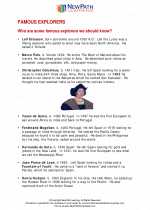 Famous Explorers
Famous Explorers  Worksheet/Answer key
Worksheet/Answer key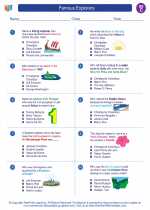 Famous Explorers
Famous Explorers  Worksheet/Answer key
Worksheet/Answer key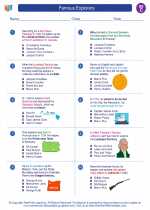 Famous Explorers
Famous Explorers  Worksheet/Answer key
Worksheet/Answer key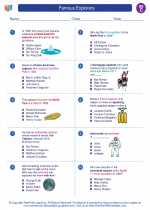 Famous Explorers
Famous Explorers  Worksheet/Answer key
Worksheet/Answer key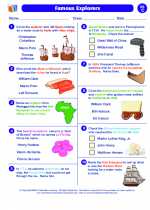 Famous Explorers
Famous Explorers 

 Worksheet/Answer key
Worksheet/Answer key
 Worksheet/Answer key
Worksheet/Answer key
 Worksheet/Answer key
Worksheet/Answer key
 Worksheet/Answer key
Worksheet/Answer key

The resources above cover the following skills:
National Curriculum Standards for Social Studies (NCSS)
TIME, CONTINUITY, AND CHANGE
SOCIAL STUDIES PROGRAMS SHOULD INCLUDE EXPERIENCES THAT PROVIDE FOR THE STUDY OF THE PAST AND ITS LEGACY.
KNOWLEDGE - Learners will understand:
The study of the past is the story of communities, nations, and the world.
Key concepts such as: past, present, future, similarity, difference, and change.
Key people, events, and places associated with the history of the community, nation, and world.
That people view and interpret historical events differently because of the times in which they live, the experiences they have, and the point of view they hold.
That historical events occurred in times that differed from our own, but often have lasting consequences for the present and future.
PROCESSES - Learners will be able to:
Ask and find answers to questions related to the past in school, community, state and regional contexts.
INDIVIDUAL DEVELOPMENT AND IDENTITY
SOCIAL STUDIES PROGRAMS SHOULD INCLUDE EXPERIENCES THAT PROVIDE FOR THE STUDY OF INDIVIDUAL DEVELOPMENT AND IDENTITY.
PRODUCTS - Learners demonstrate understanding by:
Studying important people in the community and nation, at the present time or in the past, to list qualities that make them special.
National Center for History in Schools (NCHS)
Historical Thinking Standards
Chronological Thinking
Identify the temporal structure of a historical narrative or story.
Explain change and continuity over time.
Historical Comprehension
Identify the central question(s) the historical narrative addresses.
Historical Analysis and Interpretation
Formulate questions to focus their inquiry or analysis.
Compare and contrast differing sets of ideas, values, personalities, behaviors, and institutions.
Compare different stories about a historical figure, era, or event.
Challenge arguments of historical inevitability.
Historical Research Capabilities
Formulate historical questions.
Historical Issues-Analysis and Decision-Making
Identify problems and dilemmas in the past.